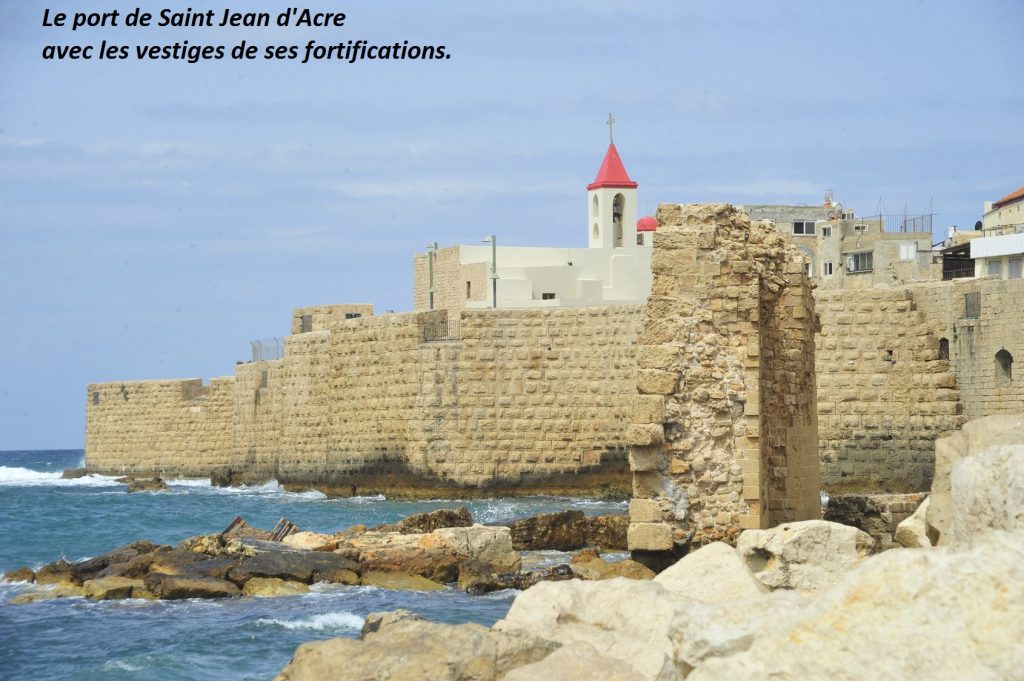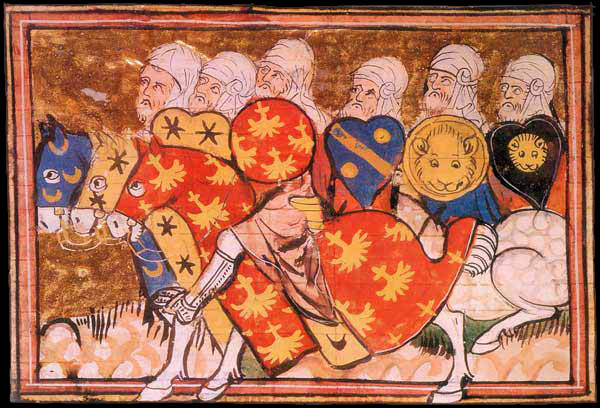
1190 AD to 1210 AD, Psalm 107: The Guide for the Perplexed
This site was first built in French (see www.147thgeneration.net). The English translation was mainly done using « google translation ». We have tried to correct the result of this translation to avoid interpretation errors. However, it is likely that there are unsatisfactory translations, do not hesitate to communicate them to us for correction.
(for that click on this paragraph)
Summary
This generation of the 1190s and 1200s.
According to our count, this generation is the 107th generation associated with Psalm 107. It is in this Psalm 107 that we therefore find an illustration of the facts of this generation.
Following the Napoleonic defeat, France The psalm associated with this generation is the first of the fifth and last book of psalms. Symbolically this means that the Jewish people are about to face the last phase of exile, and we already know it is the most terrible. To accompany this, it is important that a solid faith accompanies the Jews of these last generations who will be confronted, at the ideological level, with modernism. This could challenge ancestral beliefs based on the Torah story. Maimonides whom we have already cited for previous generations is the providential man who will enable Judaism to withstand the test of modernity.
The Guide of the Perplexed, is the major work of Moses Maimonides written around 1190. This book will be controversial in the Jewish world in the generations to come. But whether there is membership or not, every Jew will now be able to reaffirm their Judaism in relation to the modern world. A world where the Greek sciences like the philosophy of Aristotle or Plato are re-emerging in order to bring Europe out of its long lethargy.
The resumption of Jerusalem by Saladin allows the gradual return of the Jews to the promised land. Crusader rule had emptied the Holy Land of virtually all of its Jews. The return of the Jews was slowed down by Saladin’s policy of removing all fortifications, which initially prompted the Jews to settle in the « protected » towns. This often corresponds to the few coastal towns still held by the Crusaders.
This capture of Jerusalem by Saladin led to a common reaction from the new European powers. Kings and emperors unite to launch the Third Crusade (1189-1194). This was a time heralding new misfortunes for the Jews of Europe and once again for the Jews of Mainz. But this time their prayer was answered and the massacres of the First Crusade did not happen again. The Jews of York in England were less fortunate, their community was decimated, the crusaders taking advantage of the absence of Richard the Lionheart (the latter saved the same fate to the Jews of Normandy and Poitou).
Talk
The home stretch of exile
This generation is from the 1190s and the 1200s, and is also associated with the first psalm of the fifth and last book of psalms.
This last book corresponds to the last phase of exile, when Jews will be confronted with a dominant Europe politically and intellectually. The United States will take over for the last generations of this last phase being a late outgrowth of this dominant Europe.
The capture of Jerusalem by Saladin causes a joint reaction of these new European powers: kings and emperors unite to launch the Third Crusade.
To accompany this last phase of exile, it is important that a solid faith accompany the Jews of recent generations who will be confronted, at the ideological level, with modernism. He might question ancient beliefs based on the Torah narrative. Maimonides, which we have already mentioned for previous generations, is the providential man who will allow Judaism to resist the test of modernity.
The Guide of the Perplexed
The Moré Névoukhim (Hebrew: מורה נבוכים; Arabic: دلالة الحائرين (dalālat al-ḥā’irīn) literally, « Guide of the perplexed »), is the major work of Moses Maimonides (1135-1204) , considered the most influential Jewish philosopher of the Middle Ages. It was written around 1190 in Judeo-Arabic using the Hebrew alphabet.
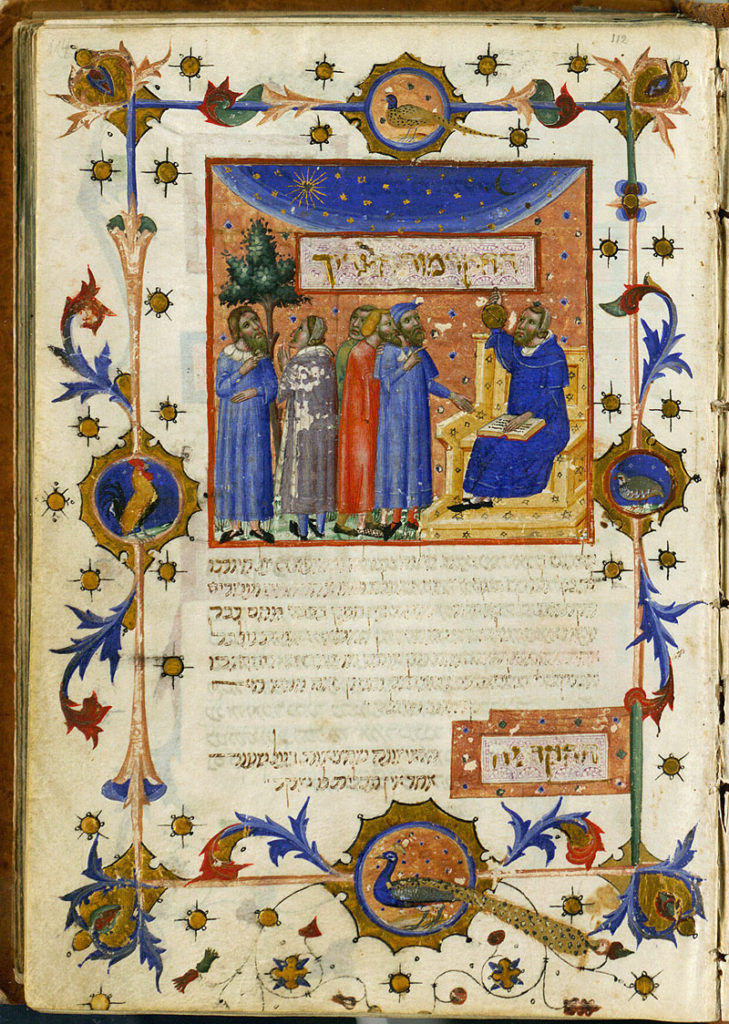
The book [1] is originally written and published in Arabic under the title « Dalalat al-Hayyirin » and is translated into Hebrew shortly after its publication, under the title of « Sefer Moreh Nebukhim » by Samuel ibn Tibbon.
This book will be controversial in the Jewish world for generations to come. But whether there is adhesion or not, each Jew will from now on be able to reaffirm his Judaism in relation to the modern world. A world where Greek sciences like the philosophy of Aristotle or Plato emerge again in order to bring Europe out of its long lethargy.
The final fight between Jacob and Esau is entering its final phase, unfortunately it will not only be in the world of ideas. The coming generations will be terrible for the Jews, the misfortunes that the Jews have been able to face the previous generations are sadly below those that await them for generations to come.
For a harmony between Judaism and Greek thought
To illustrate in part how Maimonides harmonizes Greek thought and Judaism one can quote this excerpt from « The Guide for the Perplexed » :
- It is therefore [2] absolutely in the same way that Aristotle says, of the universe in general, that one thing is necessarily emanated from another. Until one arrives at the first cause, as he expresses himself, or at the First Intelligence, or whatever you want to call it. We all have in mind one and the same principle. But he thinks that all that is outside (of this principle) is emanated from necessity. As I said, while we, we say that it is God who did all these things with purpose and in wanting this universe, which did not exist at first and which now has been called to the existence by the will of God.
- I will now, in the following chapters, produce the proofs which make me give preference to (the opinion which admits) that the world has been created.
Maimonides, who providentially will allow Judaism to survive the modern world that germinates in Europe, was in a very bad position at the beginning of his life.
The odyssey of Maimonides
Trapped by the Almohad power, it was hard to imagine that it was possible for Maimonides to lay a new foundation of Judaism in a world that only tolerated radical Islam.
After having fled Spain Almohade, then his refuge in the Maghreb, he tries at first to return to the land of Israel.
In vain, this land still under cross domination is a real desert for Judaism (« they did not find an inhabited city.« ), both at the demographic and religious levels. His last exile took him to Fostat, a suburb of Cairo, the great metropolis (« to go to an inhabited city« ), under the domination – benevolent for the Jews – of Saladin. It is from there that Maimonides will be able to complete his work and will be diffused throughout the Jewish world, that the exhausted soul of the Jewish people will again exploit the riches of his heritage (« For He sated a yearning soul, and a hungry soul He filled with goodness« ).
It is this providential destiny for Judaism that evokes the beginning of the psalm of this generation:

- Give thanks to the Lord because He is good, for His kindness is eternal.
- Those redeemed by the Lord shall say it, those whom He redeemed from the hands of an oppressor.
- And gathered them from lands, from the east and from the west, from the north and from the sea.
- They strayed in the desert, on a road of desolation; they did not find an inhabited city.
- Hungry as well as thirsty, their soul enwraps itself in them.
- And they cried out to the Lord in their distress; from their straits He rescued them.
- And He led them on a straight road, to go to an inhabited city.
- They shall give thanks to the Lord for His kindness, and for His wonders to the children of men.
- For He sated a yearning soul, and a hungry soul He filled with goodness.
In fact, Maimonides wants to give back to the Jewish people its pre-exile pride. In the book he is writing, which is published on the threshold of this generation, he draws a bitter conclusion on the impact of exile on the qualities of the Jewish people.
By making this bitter finding on the intellectual situation of the Jewish people before he decides to react by realizing his work, he also wants to stop it in the hope of a return of the Jewish people to wisdom. His wish will be granted, since Maimonides can be considered as one of the first initiators of the progress towards enlightenment. In citing a passage from the Hundred Six psalm which is the one of the previous generation, therefore the one that closes the « ancient » period of exile, Maimonides demonstrates that his book, which is being disseminated from the present generation, closes this « ancient » period. To open the « modern » period of exile.
Maimonides himself is part of the Jews who « lost » themselves in exile under Almohad rule, he was forced like many others to adopt, at least in appearance, the religion of the masters of the time, Islam:
- Moshe Ben Maimon was one of those who came from Spain. He had the wisdom of philosophy, was well versed in mathematics, and was equally devoted to science and logic. He had studied medicine there and distinguished himself there. But he had no real courage. The Berber Abd Al-Mumin Ben Ali Al Kumi, who established his dominion over the Maghreb countries, announced an expulsion of the Jews and Christians from the countries over which he reigned and fixed a date for them; he only allowed to remain and continue to earn a living only from those who would convert to Islam, provided they agreed to abide by the obligations incumbent on Muslims and refrain from what was forbidden to them. As for those who would remain faithful to their religion, they had to leave before the appointed date. And if it were still after that date, they would be sentenced to death and their property confiscated. At the promulgation of this decree, those who had few goods left. There remained only the most fortunate, attached to their house and their property. In public they displayed themselves as Muslims and in secret they remained faithful (Jews). Moshe Ben Maimon was among those who did so and remained in the country. And when he embraced Islam in the sight of all, he accepted his prescriptions, such as reading the Quran and praying. He does this until he has the opportunity to leave. He took the time to gather his goods and left Spain to go with his people to Egypt, where he settled in the city of Fostat among the Jews who were there and publicly disclosed his faith […].
- At the end of his life, he met a man who had left Spain and arrived in Egypt, a Muslim scholar named Abu El-Arab Ma’isha, who proved that he had converted to Spain and demanded that the death penalty is applied to him. Cadi Abd al-Rahim bin Ali al-Fadal prevented this by saying: « A man converted by force, his Islam can not have legal value » …
This situation of the Jews in exile recalled by Maimonides, illustrated by his own case is the subject of the following of the psalm of this generation:

- Those who sit in darkness and the shadow of death, prisoners of affliction and iron.
- For they rebelled against the words of God, and they scorned the counsel of the Most High.
- And He humbled their heart with toil; they stumbled with no one to help them.
- And they cried out to the Lord in their distress; from their straits He saved them.
- He took them out of darkness and the shadow of death, and He broke open their bonds.
The return of the Jews to the Promised Land
The resumption of Jerusalem by Saladin allows the gradual return of the Jews to the promised land. The domination of the Crusaders had emptied the Holy Land of almost all its Jews.
The return of the Jews was slowed down by Saladin’s policy of suppressing all fortification, which at first encouraged Jews to settle in « protected » towns, which often corresponded to the few coastal towns still held by the Crusaders :
- (A Jewish immigrant from France – later than this generation -) had [3] gone to Jerusalem, but had not succeeded in rooting there. Like many immigrants from France, he finally settled in Saint-Jean d’Acre (where he had landed before), in Frankish territory held by the Crusaders. This choice may be surprising, but it is the direct consequence of the defensive policy put in place by Saladin. This tended to prevent the return of the Crusaders in force: the sultan had indeed ordered the dismantling of the walls of the former cities of the Frankish conquerors, to prevent them from returning and to retreat quickly. The conquered cities had therefore become unsafe, so the newcomers preferred a quieter stay. […] In Jerusalem, the destruction of the walls of the city, in 1219, will cause the departure of a large part of the population, including Jews.
Even if this decision of Saladin will not be fully profitable to the Jews at first, the suppression of the Frankish fortifications in the Holy Land marks the end of the Christian pretensions in the Land of Israel and is a promise for the future for the Jews who will succeed in resettle fully on their land.
This is the meaning of the following of the psalm of this generation:

- They shall give thanks to the Lord for His kindness, and for His wonders to the children of men.
- For He broke copper doors, and cut off iron bars
The Third Crusade
If Saladin’s resumption of the Holy Land opens the way for hope for the Jews with regard to their settlement in the land of Israel, it will be a new source of concern for the Jews of Europe.
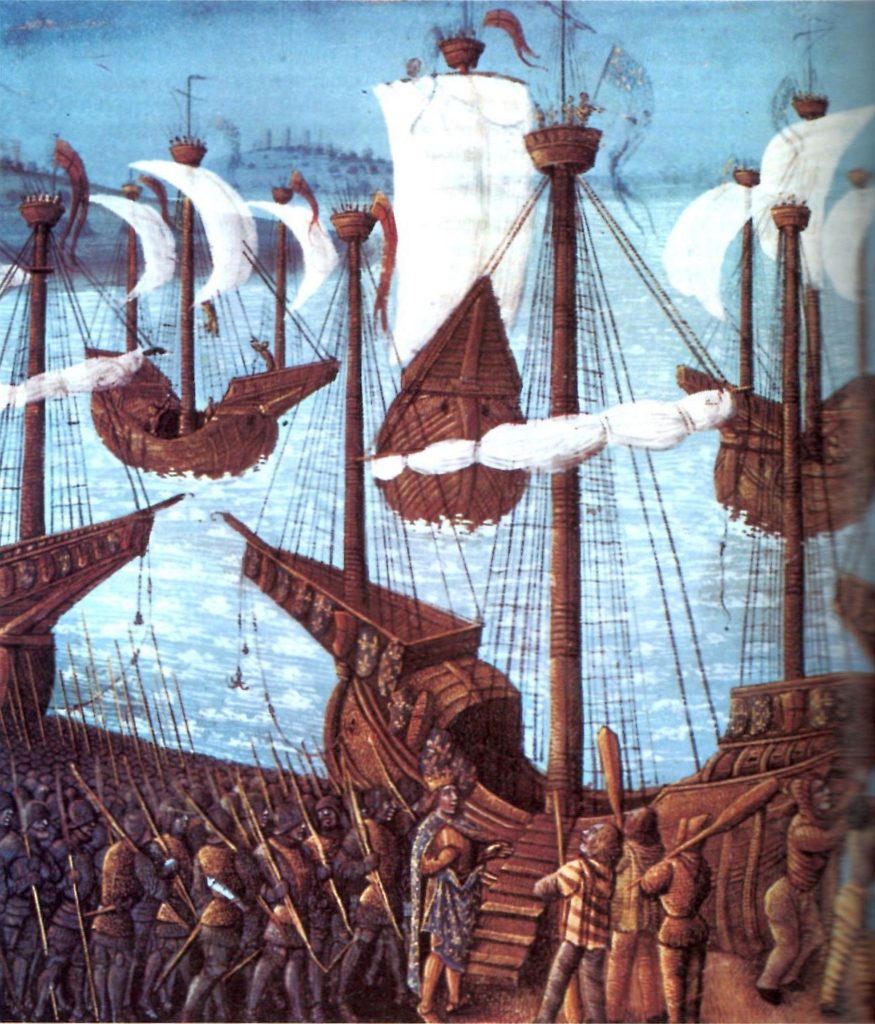
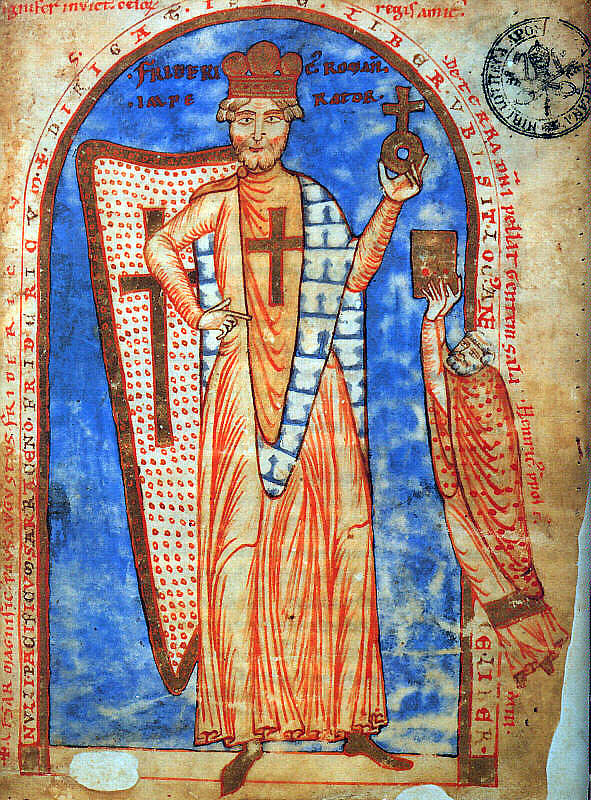
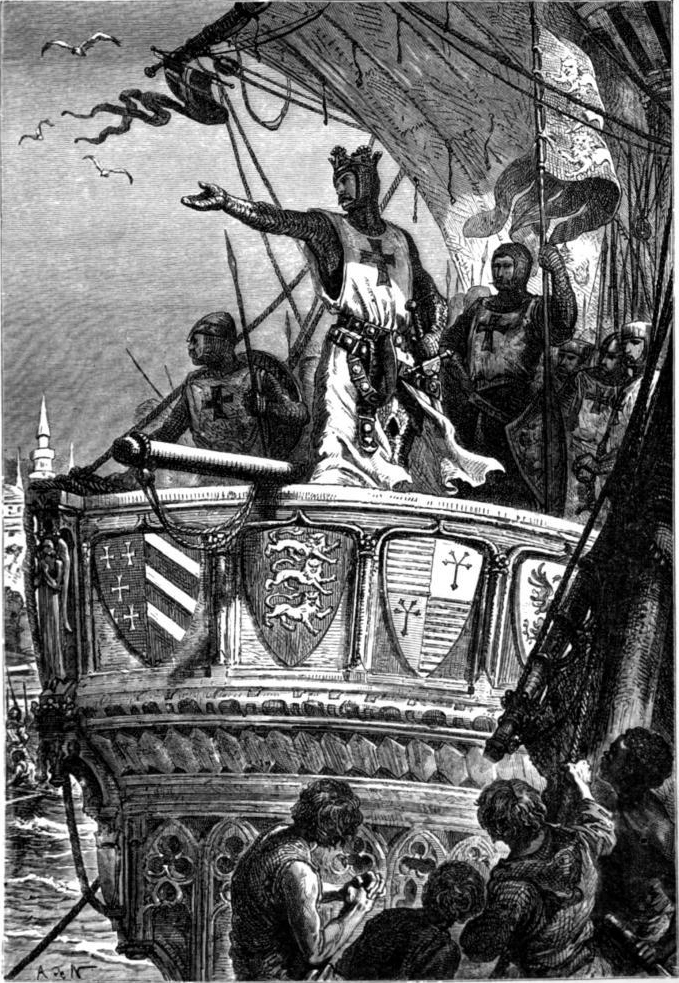
Indeed, European Christianity reacts by organizing the Third Crusade. This was a time of anticipation of new misfortunes for the Jews of Europe and once again for the Jews of Mainz, but this time their prayer was granted and the massacres of the first crusade did not happen again:
- When [4] this news (the taking of Jerusalem by Saladin and the alleged sacking of the Holy Sepulcher) reached the German countries, the Christians told themselves that the day of the massacre of all the Jews had arrived. They then imposed a fast accompanied by lamentations and manifestations of mourning. On Thursday, January 29, 1188, Christians gathered at Mainz. They rushed into the street of the Jews who locked themselves in their houses. The assailants threatened to enter one of them when the treasurer’s men sprang up, who chased the attackers and saved the Jews.
- The Crusaders by the thousands claimed the death of the Jews. The rabbis enjoined their flock to fast and to implore the Lord. On Saturday the 13th of Adar I (February 13th, 1188), Judah of Kalonymos, the father of Rokeah (the one who told these facts), ascended the pulpit and asked, along with other rabbis, that the presents were impose fasting on Mondays and Thursdays until the month of Nissan, to do charity and pray for God to keep them from death and apostasy. The Jews of Mainz, Speyer, Strasburg, Worms, Würzburg and all the cities where Jews lived had planned to take refuge in fortresses. […]
- It was at this time that the « old king » – so called the emperor – his son the duke (the future Henry VI) and all the lords took the cross. Among the ten thousand Crusaders, the emperor and his son were the only ones who showed in these circumstances some sympathy towards the Jews, to the great spite of their enemies. […]
- (After some attempts by the crusaders to avoid the Jews) The emperor issued a harsh decree: « Anyone who strikes a Jew and injures him will have his hand amputated. Whoever will kill (a Jew) will be executed. The bishops threatened on their side with excommunication those who would raise their hands on them. All this was widely disseminated, orally and in writing. […]
- The protection of the emperor and his son, as well as that of the bishops, became effective.
The following of the Psalm of this generation evokes this faith of the Jews of Europe who despite adversity continues to trust in God and who tries in a collective fast to erase any bitterness about the faults of the Israelites in the desert. origin of the long exile of the Jewish people:

- Fools, because of the way of their transgression and because of their iniquities, are afflicted.
- Their soul despises all food, and they reach the portals of death.
- And they cried out to the Lord in their distress; from their straits He saved them.
- He sent His word and healed them, and extricated them from their pit.
- They shall give thanks to the Lord for His kindness, and for His wonders to the children of men.
- And they shall slaughter sacrifices of thanksgiving, and they shall tell of His deeds with song.
If the ardor of the Crusaders’ sympathizers could have been contained and thus could have been avoided a fatal fate to the Jewish communities of Europe, as evoked by the end of the previous passage of the psalm, it is not without sacrifices within these communities, which illustrates the end of the passage of the psalm above mentioned. Such as the sacrifice of the Jews of York in England whose community was decimated, the Crusaders taking advantage of the absence of Richard Lionheart (the latter avoided the same fate to the Jews of Normandy and Poitou).
Maimonides, for his part, was able to distance himself from Europe and his troubles, but his refuge in Egypt was darkened by the death of his brother. When he wrote the « Guide of the Lost, » Maimonides had enough perspective on this event not to consider it a divine injustice. In fact, the life choices he was forced to make led him to ways that he might not have taken in more favorable circumstances. Perhaps then his work could not have been hatched, or by not being the vizier’s doctor, he would not have obtained the same protection when his conversion to Islam was denounced in Egypt.
This difficulty for man to understand the misfortunes that overwhelm him, perfectly adapted to that suffered by Maimonides is announced in « The Guide for the Perplexed »:
- Certainly [6], if it is true, as he (Aristotle) says, that the submersion of the ship with his crew and the collapse of the roof on the people of the house were the effect of pure chance, this It was not, in our opinion, the result of chance that some entered the ship and the others sat in the house; on the contrary, (this has happened) by the effect of the divine will, according to what people had deserved according to the judgments of God, whose rules are inaccessible to our intelligences.
The continuation of the psalm of this generation echoes the destiny of Maimonides, who by his confidence found his way despite the adversity in Egypt, at the end of his journey, from which he was able by his work to participate in the glorification of God by the people of Israel:

- Those who go down to the sea in ships, who do work in mighty waters.
- They saw the deeds of the Lord and His wonders in the deep.
- He spoke, and He set up a tempest, and it raised its waves.
- They went up to the heavens, they came down to the depths; their soul melted with trouble.
- They were frightened and staggered like a drunkard, and all their wisdom was destroyed.
- They cried out to the Lord from their distress, that He take them out of their straits.
- The tempest He had set up [settled] into a calm, and their waves were stilled.
- They rejoiced that they were stilled, and He led them to the region of their desire.
- They shall thank the Lord for His kindness, and for His wonders to the children of men.
- And they shall exalt Him in an assembly of people, and in a sitting of elders, praise Him.
In the same « The Guide for the Perplexed », Maimonides uses one of the above-mentioned verses of the psalm of this generation, which concerns him directly – but presumably he does not know it – to explain the omniscience of God in the origin of any event:
- Indeed [7] as it is God (as it was established) who has excited such will in such unreasonable animal, as it is he who made the reasonable animal had free will, and as it is he finally, who has determined the course of natural things (for chance is only a surplus of the natural, as it has been exposed, and most often it participates in nature, free will, and the will), one must to say of all this, to say of what results from these causes, that God has commanded to do such thing, or that he has said, « That such thing be. » I will give you all these examples to which you will be able to compare all that I have not mentioned (expressly).
- En parlant des choses naturelles qui suivent toujours leur cours, comme (par exemple) de la neige qui fond quand l’air est chaud, et de l’eau de mer qui est agitée quand le vent souffle on s’exprime ainsi : « Il envoie sa parole et les fait fondre (Psaume 147, verset 18) », « Il parle et fait lever un vent de tempête qui élève les vagues (Le psaume de cette génération : Psaume 107, verset 25) », de la pluie qui tombe, il est dit : « Et j’ordonnerai aux nuages de ne pas faire tomber la pluie etc. » (Isaïe, Chapitre 5, verset 6).
- Speaking of natural things that always follow their course, such as (for example) melting snow when the air is hot, and sea water that is agitated when the wind blows, we say: « He sends His word and melts them » (Psalm 147, verse 18), « He spoke, and He set up a tempest, and it raised its waves.« (The psalm of this generation: Psalm 107, verse 25) », from the falling rain It says, « and I will command the clouds not to rain upon it » (Isaiah Chapter 5, verse 6), etc
It is in this sense that the psalm of this generation concludes:

- He makes rivers into a desert, and springs of water into an arid place;
- A fruitful land into a salty waste, because of the evil of its inhabitants.
- He makes a desert into a pool of water, and a wasteland into springs of water.
- And He settles the hungry there, and they establish an inhabited city.
- And they sow fields and plant vineyards, which produce fruits and grain.
- And He blessed them, and they multiplied exceedingly, and their animals did not decrease.
- Whereas they were few and they sank down from dominion, trouble, and sorrow.
- He pours contempt upon princes and leads them astray in a wasteland where there is no path.
- And He strengthened the needy from poverty and made him families like flocks.
- The upright see and rejoice, and all injustice shuts its mouth.
- He who is wise will keep these in mind, and they will ponder the kind deeds of the Lord.

[1] Maurice -Ruben Hayoun: « The lights from Cordoba to Berlin ». (French: « Les lumières de Cordoue à Berlin ». (livre 1, page 170) )
[2] Maimonides (translated from Arabic into French by Salomon Munk): « The Guide of the Lost. » Second part, chapter 21: « The origin of the universe according to Aristotle ». (French: « Le guide des égarés ». Deuxième partie, chapitre 21 : « L’origine de l’univers selon Aristote ». (p. 311) ).
[3] Simon Schwarzfuchs : « Les Juifs au temps des Croisades ». Chapitre : « Dans le deuxième royaume de Jérusalem ». (French: « Les Juifs au temps des Croisades ». Chapitre : « Dans le deuxième royaume de Jérusalem » (p.164-165) )
[4] Simon Schwarzfuchs: « Jews in the time of the Crusades ». Chapter: « The Last Crusades » (French: « Les Juifs au temps des Croisades ». Chapitre : « Les dernières croisades » (p.143 à 146) ).
[6] Moses Maimonides (French translation of Salomon Munk): « The Guide of the Lost. » Third part. (French: « Le Guide des égarés ». Troisième partie. (p. 466) ).
[7] Moses Maimonides (French translation of Salomon Munk): « The Guide of the Lost. » Third part. (French: « Le Guide des égarés ». Troisième partie. (p. 403-404) ).

